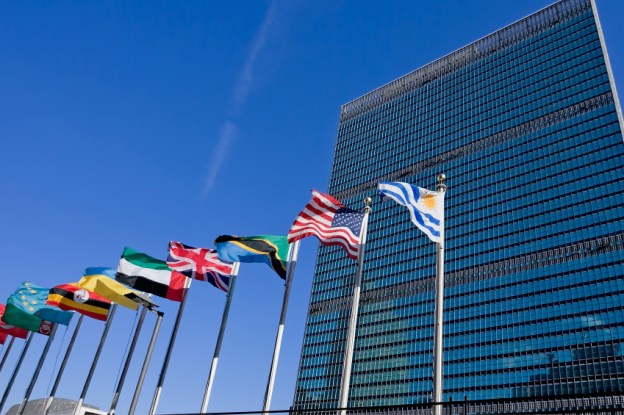
The fight against forthcoming attempts by international governments to seize greater control over the global Internet continued this morning with the House Energy and Commerce Committee’s passage of a resolution that pushes Obama administration to remain firmly opposed to such attempts.
Introduced by U.S. Rep. Mary Bono Mack (R-CA), H. Con. Res 127, which passed with strong bi-partisan support, comes in response to reported efforts from countries including Russia and China to give greater regulatory powers over the Web to the International Telecommunications Union (ITU), a wing of the United Nations that oversees global communications, like long-distance telephone service, but does not currently have any jurisdiction over the Internet. Proposals to grant more power to the ITU are expected to come up for discussion, and possibly a vote, by the ITU’s 193 member states at the World Conference on Telecommunications (WCIT), which will take place in Dubai this December.
H. Con. Res. 127 now has 58 co-sponsors, and will soon head for a vote before the full House. Read the full text of the resolution here (pdf).
What’s at stake
If adopted, these proposals would allegedly give the ITU broad powers to govern cybersecurity, the Internet address system, Web standards, and data privacy. They would also give individual governments the ability to more tightly control how the Internet operates in their respective countries. Individual government would also gain the ability to tax Internet content providers, like Google, Apple, and others, for their use of bandwidth in their country.
Currently, Internet governance operates under a decentralized, “multi-stakeholder” system, with a variety of nonprofit organizations — not governments — setting Web standards, controlling IP addresses, and performing other critical functions. That said, these organizations — the Internet Corporation for Assigned Names and Numbers (ICANN) and the Internet Engineering Task Force (IETF), to name a few — often take cues from the U.S. government. Russia, China, Brazil, India, and other ITU member states want to wrest control from the U.S., arguing that the Internet is a global phenomenon, not an American one.
Not surprisingly, interested parties in the U.S. — from corporations to politicians on both sides of the aisle — are all firmly against changing the status quo. And for good reason.
“Despite denials, the Russians and Chinese are working quietly behind the scenes – and have been for years – to exert control over Web content and infrastructure,” said Bono Mack in a statement after the House committee vote. “This could lead to human rights abuses in the future and effectively putting a spigot on the free flow of information. We can’t let that happen.”
In prepared remarks made prior to the vote, Bono Mack said, “In many ways, we’re facing a referendum on the future of the Internet. A vote for my resolution is a vote to keep the Internet free from government control and to prevent Russia, China, and other nations from succeeding in giving the U.N. unprecedented power over Web content and infrastructure. That’s the quickest way for the Internet to one day become a wasteland of unfilled hopes, dreams, and opportunities.”
Don’t believe the hype
Contrary to all these warnings, the ITU claims that everyone has the situation all wrong. “I’d be surprised if you could find anything that would support these sorts of allegations,” said ITU spokesperson Sarah Parkes in a recent interview with Talking Points Memo. “Internet governance is not an issue at this conference. Some of it will concern things like exchange, routing and roaming rates,” she added, saying that such proposals would have to be approved by nearly all of the ITU’s member states to go into effect.
Parker further added that the best way to clear up the misconceptions is for those involved to have more open communications. The problem is, the entire WCIT (pronounced “wick-it”) process is secret. The tight-lipped operation has even spawned the creation of WCITLeaks.org, a site where anonymous tipsters can post documents related to the upcoming negotiations. Of the documents already posted, it is clear that ITU member states are, in fact, pushing for the ITU to gain greater control of the Internet. Parker called WCITLeaks “very amusing.”
Last word
Even if the proposals are as bad as those in Congress believe, the U.S. could still refuse to abide by the amended ITU treaty. Unfortunately, that wouldn’t make much of a difference, since other countries would recognize it, and the same problem of greater government control of the Internet would still exist.
Furthermore, it IS wrong to think of this as a U.S. vs. the world battle. As Eli Dourado, a technology policy research fellow at Mercatus Center at George Mason University, and a co-creator of WCITLeaks explains in a blog post on Tech Liberation: “This is an Internet users vs. their governments issue. Who benefits from increased ITU oversight of the Internet? Certainly not ordinary users in foreign countries, who would then be censored and spied upon by their governments with full international approval. The winners would be autocratic regimes, not their subjects.”
Dourado goes on to point out that the U.S. should not just walk away from the WCIT negotiations in order to maintain its current control of the Web. Instead, “the U.S. should walk away from WCIT as part of a repentant rejection of Internet policy under Bush and Obama, which has consistently carved out a greater role for the government online.” And that is the real point of all this — keeping the overreaching, grubby mitts of government off our Web.


